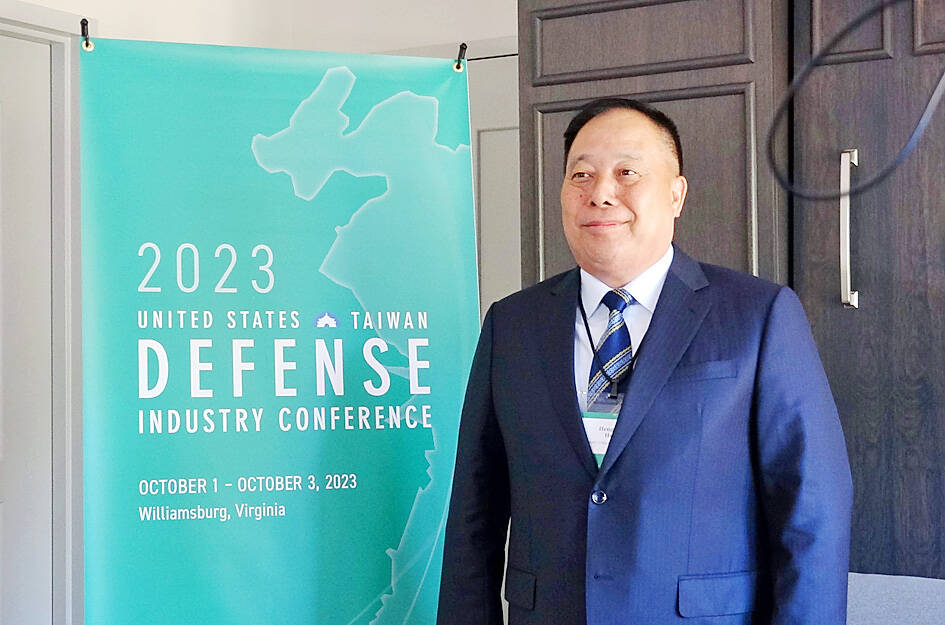The US should help Taiwan bolster its military self-reliance by accelerating deliveries of weapons Taipei has ordered, Vice Minister of National Defense Hsu Yen-pu (徐衍璞) said on Monday at the US-Taiwan Defense Industry Conference in Virginia.
The meeting was not open to the media.
Hsu called on Washington to help Taiwan with “total life cycle systems management [TLCSM]” of weapons and support systems purchased from Washington, the Ministry of National Defense said.

Photo: CNA
TLCSM is a US military term referring to the implementation, management and oversight of all activities associated with the acquisition, development, production, fielding, sustainment and disposal of a US Department of Defense weapon system across its life cycle.
Taiwan relies heavily on the US to maintain most of its US-made weapons systems and armaments, but TLCSM capabilities would enable more Taiwanese defense companies and contractors to produce and offer maintenance services for US-bought weapon systems, Hsu said.
That would speed up arms deliveries to Taiwan and help integrate the two countries’ defense industries, which would boost Taiwan’s defense self-reliance and resilience, he said.
Hsu thanked US President Joe Biden for approving 11 rounds of arms sales to Taiwan since taking office in 2021 and endorsing a US$345 million military aid package to Taiwan to be delivered under the Presidential Drawdown Authority.
These moves show that Washington is making Taipei’s defensive needs and self-defense capabilities a priority, Hsu said.
The Russia-Ukraine war has highlighted the importance of accelerating delivery of weapons systems to Taiwan to beef up its defense capabilities, he said.
The three-day US-Taiwan Defense Industry Conference was to conclude yesterday.
Since its 2002 debut, the annual conference has facilitated engagement between the US defense industry and the governments of Taiwan and the US on security matters, organizers said.
This year’s conference was the largest ever, said Rupert Hammond-Chambers, president of the event’s organizer, the US-Taiwan Business Council.
More than 200 participants from the two nations’ governments, as well as defense industry representatives, discussed the future of bilateral defense cooperation, the organizers said.

DAREDEVIL: Honnold said it had always been a dream of his to climb Taipei 101, while a Netflix producer said the skyscraper was ‘a real icon of this country’ US climber Alex Honnold yesterday took on Taiwan’s tallest building, becoming the first person to scale Taipei 101 without a rope, harness or safety net. Hundreds of spectators gathered at the base of the 101-story skyscraper to watch Honnold, 40, embark on his daredevil feat, which was also broadcast live on Netflix. Dressed in a red T-shirt and yellow custom-made climbing shoes, Honnold swiftly moved up the southeast face of the glass and steel building. At one point, he stepped onto a platform midway up to wave down at fans and onlookers who were taking photos. People watching from inside

A Vietnamese migrant worker yesterday won NT$12 million (US$379,627) on a Lunar New Year scratch card in Kaohsiung as part of Taiwan Lottery Co’s (台灣彩券) “NT$12 Million Grand Fortune” (1200萬大吉利) game. The man was the first top-prize winner of the new game launched on Jan. 6 to mark the Lunar New Year. Three Vietnamese migrant workers visited a Taiwan Lottery shop on Xinyue Street in Kaohsiung’s Gangshan District (崗山), a store representative said. The player bought multiple tickets and, after winning nothing, held the final lottery ticket in one hand and rubbed the store’s statue of the Maitreya Buddha’s belly with the other,

‘NATO-PLUS’: ‘Our strategic partners in the Indo-Pacific are facing increasing aggression by the Chinese Communist Party,’ US Representative Rob Wittman said The US House of Representatives on Monday released its version of the Consolidated Appropriations Act, which includes US$1.15 billion to support security cooperation with Taiwan. The omnibus act, covering US$1.2 trillion of spending, allocates US$1 billion for the Taiwan Security Cooperation Initiative, as well as US$150 million for the replacement of defense articles and reimbursement of defense services provided to Taiwan. The fund allocations were based on the US National Defense Authorization Act for fiscal 2026 that was passed by the US Congress last month and authorized up to US$1 billion to the US Defense Security Cooperation Agency in support of the

HIGH-TECH DEAL: Chipmakers that expand in the US would be able to import up to 2.5 times their new capacity with no extra tariffs during an approved construction period Taiwan aims to build a “democratic” high-tech supply chain with the US and form a strategic artificial intelligence (AI) partnership under the new tariffs deal it sealed with Washington last week, Taipei’s top negotiator in the talks said yesterday. US President Donald Trump has pushed Taiwan, a major producer of semiconductors which runs a large trade surplus with the US, to invest more in the US, specifically in chips that power AI. Under the terms of the long-negotiated deal, chipmakers such as Taiwan Semiconductor Manufacturing Co (TSMC, 台積電) that expand US production would incur a lower tariff on semiconductors or related manufacturing